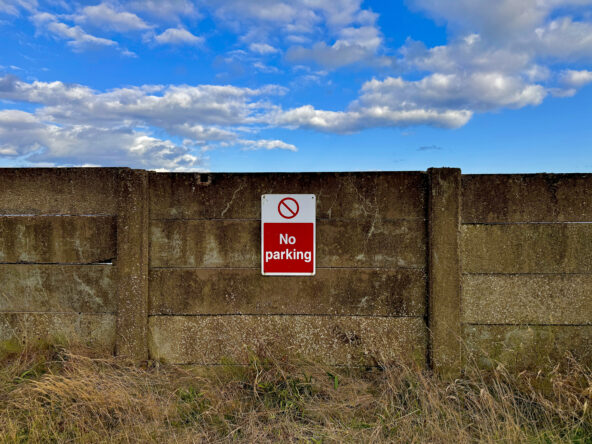Common sense is one of those things that is easy to take for granted—until you’re faced with a situation that makes you wonder how someone missed the obvious.

Nobody’s perfect or has all the answers, of course, but being able to read the room, think practically, and make decisions that don’t leave everyone else shaking their heads are pretty important skills to have. Unfortunately, it’s in these 13 situations when a clear lack of common sense tends to show up—and they stick out like a sore thumb when they do!
1. Ignoring clear safety warnings because “it’ll probably be fine”

Whether it’s walking around a construction site without a helmet, swimming where signs say not to, or balancing precariously on a chair instead of grabbing a ladder, brushing off safety warnings is a classic sign of not thinking things through. Common sense usually whispers, “Better safe than sorry.” When someone treats real risks like suggestions instead of essentials, it tends to raise eyebrows, and sometimes lead to entirely avoidable problems.
2. Leaving valuables visible in an unlocked car

It might seem obvious that leaving a wallet, phone, or laptop sitting on the passenger seat with the doors unlocked is asking for trouble, but somehow it still happens all the time. Basic precaution is a big part of common sense. Ignoring simple steps like locking up valuables suggests a lack of awareness about how the world actually works, and a lot of unnecessary trust in strangers.
3. Sending sensitive information over unsecured channels

Giving out credit card numbers, passwords, or personal details over public Wi-Fi, unsecured emails, or random websites shows a surprising disregard for personal security. Common sense says to slow down and double-check where your information is going. When people act like the internet is automatically safe, it often leads to problems that could have been easily avoided with a little caution.
4. Touching wildlife or getting dangerously close to animals

Whether it’s reaching out to pet a wild animal, getting too close to a bison at a park, or trying to grab a selfie with something clearly dangerous, ignoring nature’s boundaries is a classic case of bad judgement. Common sense would suggest that wild animals are unpredictable for a reason. Acting like they’re cartoon characters instead of powerful creatures often leads to situations that are risky for both people and animals.
5. Parking in a clearly marked no-parking zone and being surprised when ticketed

There is always that moment when someone shrugs and says, “I thought it would be fine,” as they stare at the parking ticket left on their windscreen in front of a bright red “No Parking” sign. Ignoring obvious rules, especially when the consequences are clearly spelled out, shows a short-sightedness that is hard to miss. Common sense suggests weighing the risk before acting, not pretending it does not exist.
6. Speaking loudly on sensitive topics in public places

Sharing private business deals, personal gossip, or confidential information at full volume in a café or on public transport shows a complete lack of situational awareness. Common sense would suggest that not every conversation is meant for public consumption. Lowering your voice and reading the room is one of those basic, invisible skills that keeps life running more smoothly.
7. Believing everything on the internet without question

Forwarding every shocking headline, panicking over random social media posts, or falling for obvious scams online points to a major gap in critical thinking. Common sense involves a healthy dose of scepticism, and it comes with asking simple questions like “Does this seem credible?” or “Who benefits if I believe this?” Blind trust in random information sources usually leads to unnecessary confusion or even real harm.
8. Leaving a candle burning unattended in an empty house

It might seem harmless—just one little candle—but leaving an open flame unattended is one of those basic no-nos drilled into most people for good reason. When someone heads out the door with candles still burning, it shows a real gap in risk awareness. Common sense calls for small precautions that prevent big disasters, and overlooking something this basic tends to stand out.
9. Disregarding basic hygiene in shared spaces

Leaving dirty dishes to pile up in communal kitchens, not washing hands after using the restroom, or coughing openly without covering your mouth might not seem like big deals individually, but they show a disregard for other people’s well-being. Common sense suggests that shared spaces require shared responsibility. Failing to take those small, obvious steps tends to frustrate everyone around, and rightly so.
10. Ignoring clear instructions because “they probably don’t matter”

When instructions say “assemble on a flat surface” or “wait 24 hours before use,” blowing them off because you’re impatient or think the guidelines are just suggestions often leads straight to wasted time, broken items, or preventable disasters. Common sense recognises that instructions are usually there for a reason. Dismissing them without even considering why they exist is a sure sign that practical thinking might be a little thin on the ground.
11. Oversharing personal details with total strangers

There’s a difference between being friendly and giving away your entire life story, especially details like where you live, your income, or your full travel plans, to people you barely know. Common sense suggests a little caution and gradual trust-building. Oversharing right away can create awkward, unsafe, or downright risky situations that could easily have been avoided with a little more thought.
12. Leaving doors unlocked because “it’s a safe area”

Feeling comfortable in your neighbourhood is a good thing, but assuming that nothing bad could ever happen because “this is a nice area” shows a dangerous gap between optimism and reality. Common sense doesn’t mean living in fear. It means understanding that basic precautions like locking doors are about creating smart habits, not being paranoid. Skipping them can turn minor lapses into major problems fast.
13. Thinking emergencies only happen to other people

Putting off learning basic skills like CPR, not having a first aid kit, or never bothering with emergency contacts because “those things won’t happen to me” shows a lack of practical thinking that can have real consequences.
Common sense suggests preparing not because you expect disaster, but because you know life is unpredictable. Being ready for small emergencies is one of the simplest ways to protect yourself and other people, and ignoring that is a mistake you do not want to learn about the hard way.




